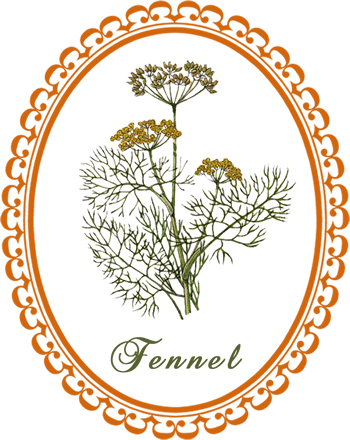
Fennel: excellent remedy for colic and flatulence. Helps increase milk flow in breastfeeding ...
Common Names: Fennel
Botanical Name: Foeniculum vulgare
Family: Apiaceae
Plant Type: Tender Perennial
Parts Used: Leaves and seeds
Flowering: July and August
Fennel is generally considered indigenous to the shores of the Mediterranean, but has become widely naturalized elsewhere and may now be found growing wild in many parts of the world, especially on dry soils near the sea-coast and on river-banks.
Description: It is erect, light bluish-green, and grows to heights of up to 2.5 m, with hollow stems. The leaves grow up to 40 cm long; they are finely dissected, with the ultimate segments filiform (threadlike), about 0.5 mm wide. (Its leaves are similar to those of dill, but thinner.) The flowers are produced in terminal compound umbels 5–15 cm wide, each umbel section having 20–50 tiny yellow flowers on short pedicels. The fruit is a dry seed from 4–10 mm long, half as wide or less, and grooved.
Cultivation: Fennel is a tender perennial (hardy to zone 6) which is grown as a annual in colder areas. It prefers average, well-drained soil in full sun, with a pH of 6.5.
Harvesting: Harvest leaves any time, then use fresh, or freeze for future use. Pick flowers in late summer and use fresh. Collect seeds when ripe in autumn; dry for storage.
Culinary Uses: Fennel has a softer licorice flavor than anise. Use the leaves and seeds of sweet fennel; the stalk and bulb of Florence fennel. Use the leaves in salads; eat the stalks like celery. The seeds are used in desserts, breads, and beverages.
Fennel Magick
Protection. Healing. Purification.
Gender: Masculine
Planet: Mercury
Element: Fire
Grow fennel around your home for protection.
Use the seeds as incense to bless any new activities.
Use fennel in purification sachets and healing mixtures.
Hangs sprigs at the doors and windows to keep out evil spirits.
Add a few seeds to your bathwater to strengthen your body, help you relax, and clear your mind.
Herbal Healing with Fennel
Cosmetic Uses: Fennel is cleansing and medicating; use in steam facials to help open pores. It's used commercially in lotions, perfumes, and soaps.
Medicinal Actions: Antibacterial, antidote, antiemetic, antifungal, antiphlogistic, antiseptic, antispasmodic, antitoxic, aperitif, appetite, astringent, calmative, carminative, decongestant, depurative, detoxifier, diaphoretic, digestive, diuretic, emmenagogue, estrogenic, expectorant, galactagogue, hepatic, insect repellent, insecticide, laxative, parasiticide, regulator (female reproductive system), resolvent, revitalizing, stimulant (uterine contractions, estrogen levels), stomachic, tonic, vermifuge
Medicinal Uses: Fennel increases milk flow in nursing mothers and relieves infant colic. It stimulates appetite and digestion, and soothes upset stomachs. It also calms bronchitis and coughs. Use externally to treat muscular and rheumatic pains; or use as a compress to treat conjunctivitis or inflammation of the eyelids.
Body Care with Fennel
To relieve indigestion, take 1 cup fennel seed infusion up to three times daily, as required.
For a deep facial skin cleanse, use a fennel steam inhalation.
Infusion: Crush 1/2 teaspoon dried fennel seeds and infuse in 1 cup just-boiled water for 10 minutes. Strain.
Inhalation: Place 2 teaspoons crushed fennel seeds or 2 handfuls of fresh fennel leaves in a bowl with 3 litres (12 cups) boiling water.
Source: The Essential Herbs Handbook by Lesley Bremness
If you appreciate the information provided,
please help keep this website running. Blessings!
© 2008-2025 aromaworx.ca. All rights reserved.

